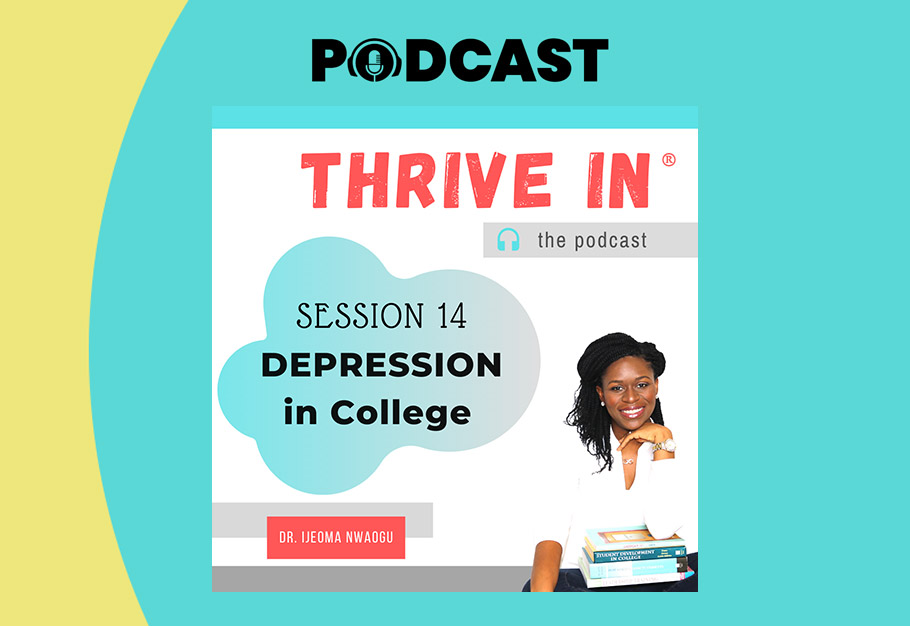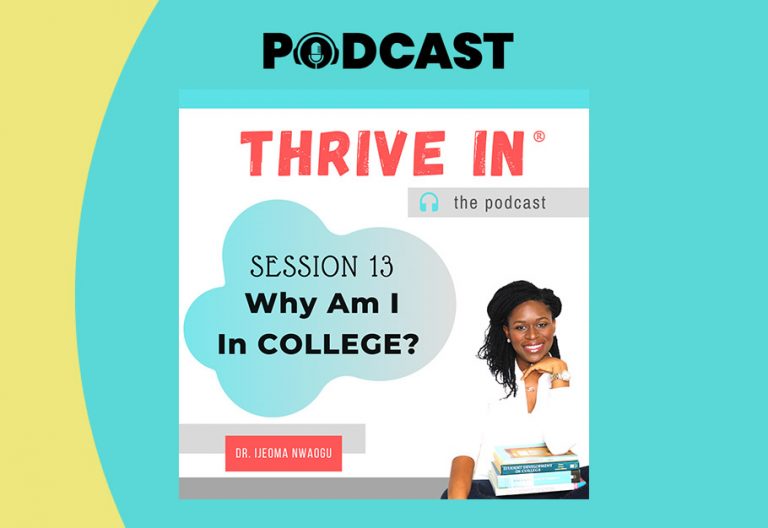0:01
When I was in college, I was depressed for like a year and a half as a sophomore and into my junior year. I remember staying in bed every single day, crying all into the night, and waking up in tears again the next morning. I mean, these crying spells happened every single day. I felt really sad. And I wasn’t interested in doing activities with my peers, my friends, and my roommates even thought I was crazy and didn’t understand my behaviors.
0:35
And you know, at the time, I didn’t even realize that I was depressed. I just never thought about this idea of being depressed. I just knew I was very sad and crying all the time. And this thing that I was experiencing, it kept me in this constant state of sorrow and sadness. There were a lot of things that I felt triggered this experience. I was trying to figure out myself major, I wasn’t quite sure what I was going to do career wise. But mainly my heartache came from a romantic relationship where I was rejected by someone who I thought I was, “in love” with.
1:14
When I think about my college experience, I do remember how difficult it was to navigate a lot of these hardships and this feeling, and it was quite overwhelming. And I wasn’t even aware of the access, I had to like college resources to help me identify my depression and work through it. And after a long while, I eventually came out of those heavy feelings. With the help of like, church lessons and involvement in a positive community.
1:41
However, I do wish I had taken advantage of some of the resources that were available to me during my time in college, which probably could have supported me through the process of going through this depression or to help me come out of that negative state much faster. So in reflecting on my own experience as a college student who was depressed, it really motivates me to do this session because my goal is to help you understand and overcome depression or any persistent feelings of sadness, so that you could feel better and happier while in college.
2:22
Welcome to Thrive IN® and greetings from Houston,Texas. This is Dr. IJ. Your very own life coach. Thrive IN® is a life coaching podcast for college students. And believe me, you are in the right place if you’re eager to grow into your greatest self, while making the most of your time in college. This is session number 14. And for the session I want to talk with you about depression, understanding what it is and how to navigate it in college.
2:51
My hope for you is that you’ll feel more knowledgeable about this experience and feel more equipped to address it if it’s something that you’re dealing with. And you might even gain some great pointers on how to support a friend who might be going through this as well. First, you might be wondering, what actually is depression? What does it look like? What does it mean? Now if you remember the movie Get Out, the main character is falling into this “sunken place”, which is a dark hole that he continues to plunge into while kicking and screaming in the air and fighting to save himself from dropping deeper into the hole.
3:29
So this constant struggle is kind of what depression reminds me of, or what it can feel like for some people. One thing I want you to understand about depression is that it is not a choice. You don’t just choose to wake up one morning and you’re like, “yep, I’m going to feel depressed, I’m going to be depressed”. And it’s something that’s certainly not your fault. Depression keeps you paralyzed in your mind and in your body.
3:54
And so that’s why for some people, it feel like this helpless kind of experience where you’re falling into the sunken place that you didn’t ask to be plunged into some facts to know about depression is that it’s really a huge issue that affects 300 million people around the world. That’s a whole lot of folks, right? It’s a very common thing that happens to people. So know that you’re not alone. One in five people will experience depression at some point in their lives, one in five people.
4:24
So I want to give you a list of symptoms that are associated with depression. So it’s said that if you experience at least five of the listed symptoms, you may very well be suffering from depression. So here they are. If you feel hopeless or helpless emptiness or worthlessness, those sorts of feelings, that’s one characteristic. Number two, if you’re easily irritated or frustrated and overwhelmed; if that happens quite frequently. That’s another characteristic. Anxiety is another one. Slowed behavior both physically and mentally. If you feel like you’re slowing down and you’re not being as productive as you used to be.
5:04
That’s another sign. Folks who are dealing with depression also lose interest in daily activities or hobbies. Some people lose their appetite. They stopped eating or some people eat more because of the experience that they’re having with depression. A lot of folks dealing with depression will report lack of energy or frequent exhaustion. You know, when I told you my story, I was in bed often like all the time, early every night just laying there crying just stuck in my room stuck in my bed.
5:37
Another symptom is abnormal sleeping patterns. You may not be sleeping well or you might be sleeping too much. And another one, which is more on the serious note, is frequent thoughts of death and suicide. But want you to take caution because people around you may observe like your demeanor or your behaviors and wave you off as being “too dramatic” about your current state or the things that you might be going through. But I want you to know that many people may not even understand the realness and the seriousness of what you’re experiencing. But I want you to know that you’re not being too dramatic.
6:14
If this is something that you’re dealing with, you’re not being too dramatic, your feelings and your experiences are absolutely valid. And sometimes when people are dealing with depression, they distance themselves or they isolate themselves because they don’t want to be a burden to other people, or to be what people call a Debbie Downer, or whatever the case may be. So it’s normal to be distant because you don’t want to be a burden, right?
6:38
But first of all, what even triggers depression, what causes people to fall into this experience? Depression is a clinically diagnosed disorder that is the result of this chemical imbalance in our brains. And oftentimes, people will observe it or experience it as feelings of sadness. Depression can be triggered by life circumstances or situations that may lead you to experience these feelings.
7:05
Now as a college student, situations that spark depression or these persistent feelings of sadness can be the result of any of the following. For example, the rigors of your academic work or difficulties with romantic relationships and friendships like I experienced, or things like feelings of isolation, loneliness, or lack of having a sense of belonging on campus. Some people say homesickness was the trigger or navigating autonomy or your independence as a college student.
7:33
Some folks report money struggles as being something that they’re persistently trying to grapple with or feel stressed about or hopeless about. And some students deal with confusion about who they are, their self identity, and their life purpose. So these are some of the circumstances that can trigger depression. The next thing I want to explain to you is who gets depressed.
7:55
Depression affects everyone. No matter what society tries to say or paint a picture for us to believe that a certain group is prone to depression, depression can affect anyone. It does not discriminate. You can be the strongest person, the happiest person, the most energetic person in the eyes of others or even yourself, but circumstances or your mere physiological condition can lead to depression.
8:22
Now depression doesn’t, favor men and only impact women. Anyone across the gender spectrum can experience depression. Also, it’s not limited to a particular race, or age groups, all sorts of people can become depressed. Now I want you to really have a good understanding as to why I’m talking about depression for this particular session and why this conversation is really important. For me, it’s really important to raise awareness about depression amongst college students because society really tends to stigmatize depression or misunderstand people who suffer from this disorder.
9:03
But again, I’d like to reiterate that depression is a totally common condition, and discussions surrounding it should be welcomed and normalized. That’s what I believe. Too many suicides keep happening each year, roughly 800,000 victims that is so many in this world! So it’s super important to really tackle depression, to lessen the chances of facing suicidal thoughts and actions. I think it’s also important for us to talk about this chronic sadness or depression, because it can actually cause other health issues that will impact your overall performance in college. I just want to encourage you learning to talk about and deal with depression and sadness is important to start practicing now while you’re in college.
9:52
And once you get into this practice, you become better prepared for more difficult situations and circumstances you’ll likely face as you progress in life. So learning and applying the feedback that I’ll share with you now will be of great benefit to you. So I would just want to offer you some things to think about. Things that you can do for yourself as you journey through this experience of depression if this is something that you’re dealing with.
10:19
The first thing I want you to consider is embrace opportunities to shape your mindset. You can even watch inspirational or motivational videos and talks that will get you thinking more optimistically, and watch things that can offer you a new perspective on life. You can even attend leadership programs or go to church to get encouraging messages. This is something really important that you could spend time doing, nurturing yourself with good information with optimistic information that could really give you the strength you need to persevere and to keep going while you’re dealing with depression.
10:57
The second piece of feedback is to take good care of yourself. Think about not over studying or try to avoid binge drinking, try to eat healthy meals or healthy foods. So you could also exercise and we know that exercise helps you to release endorphins, which produces positive feelings in your body. Also, you could get a good night’s sleep as it can really help you to ward off depression. You could think about prioritizing your time and attention.
11:26
Be what I like to call an internal activist. Make sure you are advocating for yourself to make sure you’re doing things and you’re setting boundaries to take good care of your body and your mind. Number three, it’s nice to spend time in solitude but try not to isolate yourself for too long. Be engaged with your surrounding community. Now I want to be very clear. Sometimes when you have these intense feelings, it is okay to sit with those feelings and to feel them and to be present.
12:00
And to see what it feels like and to just go through it, right? And feel the pain, it’s totally okay. But if you feel that you are tired of dwelling on those pains for too long, you could get up and change your environment or get up and do something different or call a friend or connect with others. Just go outside, get some fresh air and engage with your peers or your community, right. So, I want you to know that both things that I mentioned are okay, to sit with your pain, it’s totally fine.
12:30
That’s part of the healing process. And then once you feel that you don’t want to sit in that pain anymore, make sure you get up and go spend time with other people. Number four, take advantage of campus resources. This is something that I mentioned in my story. I did not visit my Counseling Center when I was in university, when I really should have because most times you could speak to a counselor for free and that person can help you talk through the difficulties you might be facing in college.
13:03
And a counselor can help you overcome some negative feelings and even help shape your mindset. Overall just to offer you that support that you need to get through this experience. Number five is to talk to people you trust, talk to your loved ones about what you’re dealing with. These folks can certainly offer you the moral support, you need to keep your head up. And you know, life is not meant to be done alone. You could let others help you.
13:29
Number six, you don’t have to compare yourself to others. If you feel like your peers are so happy, just know that you never know what they’re dealing with in private. You just never know, right? Sometimes when people are out in public, they show as if they’re not going through anything that they are just happy all the time. And that’s not the case, as you know. But just know that you have your own unique journey and your own unique experience to get to this destination that you’re trying to reach and there are certain experiences that you’ll have that may not make any sense to you, but know that they are purposeful.
14:04
And they will not look like what everyone else is going through. It can help to not compare yourself to what other people are dealing with. Everyone will have their darker seasons and maybe while you’re going through your dark season, your peers aren’t going through it. And then when you’re finally in a better place, they may be going through something. So just know that there’s a time or a season for everyone. Your experience may look different from what your peers are dealing with.
14:32
Number seven, you can consider keeping a gratitude journal. So this might be any small or bigger sized notebook that you perhaps keep by the side of your bed and every morning when you wake up or every night before going to bed, you can write maybe five things you could quantify the way you want. But I would say just five things you are thankful for, for that day. What this does is it could help shift your psyche in being aware of a lot of the good things that are happening in your life, and it gives you a chance to really dwell on those good things, and possibly end your night in a good way or start your morning in a very optimistic way.
15:13
Number eight is to know that something good can actually come out of this experience. And I know depression doesn’t sound fun. It certainly is not. It’s a very difficult thing to go through. But having this mindset that something good can actually come out of it. And as I mentioned before, just feel okay, be okay with sitting in these feelings and these thoughts. Because when you get out, you develop this greater gratitude that you were able to survive such an experience, and it helps you to appreciate your current mental state.
15:48
That’s my feedback for you. Now, if you’ve been told things like, “you’ll be fine”, you know, if you tell someone that you’re dealing with feelings of depression, and they tell you “Oh, you’ll be fine”, or something like “you’re thinking too much”, or “you just need to get out more”, those comments can actually make you feel worse, right? Or make you feel more tense about what you’re dealing with. Now, if you’ve been told these things, just know that that’s not really sound advice. And be ready to forgive the folks who say it and not to hold a grudge or be offended by them, because they may not have a good understanding of what depression really is and what it’s all about.
16:29
You are now more informed about what depression really is. And it’s not just about “you’ll be fine”. It’s not just about “Oh, you’re thinking too much”, or it’s not just about “Oh, you just need to get out more”. It’s much deeper than that and just know that your experience is absolutely valid. Again, I want to help you understand that people are not well-versed when it comes to depression. They may make comments that are actually harmful when they think they’re helping you but they’re not doing it out of malicious intent.
16:56
They actually genuinely think that they’re giving you good feedback. So with us information, it helps to not feel offended by some of these comments. And to just know to take it with a grain of salt and keep it moving and be willing to forgive these folks. So if you know a friend who was dealing with depression, all you have to say is this:
17:15
“I am here for you.” I am here for you. That’s all you could offer someone who’s dealing with depression, no feedback, no advice. None of that. People who are dealing with depression, just want to know that someone is just there. Someone is present, right? That’s it. There’s no task that needs to be done unless they ask you for something. But the only reassuring thing you can offer that is very reassuring, is: I am here for you.
17:42
And that’s something I want to offer to you as well. I am here for you. My question for you is, what steps will you take based off of the feedback that you’ve gained from the session— What steps will you take to address your depression if this is something that you’re dealing with? And how will you use this information to help a friend?
18:02
Well, that’s it for this session thrivers. I invite you to connect with me at thriveinpodcast.com, where you’ll find wonderful resources just for you. If you love what you’ve heard during the session, I encourage you to rate and review the podcast on Apple podcasts. Now, don’t you want all your friends to know about the show? Be sure to share this session with a friend and send me a message on topics you’d like me to speak about. Feel free to follow and like me on social media at the handle, DRIJCLC, which stands for Dr. IJ. college life coach again. That’s DRIJCLC. I’m wishing you a safe, happy, and thriving week.
18:46
Join me for the next session. Love you.






